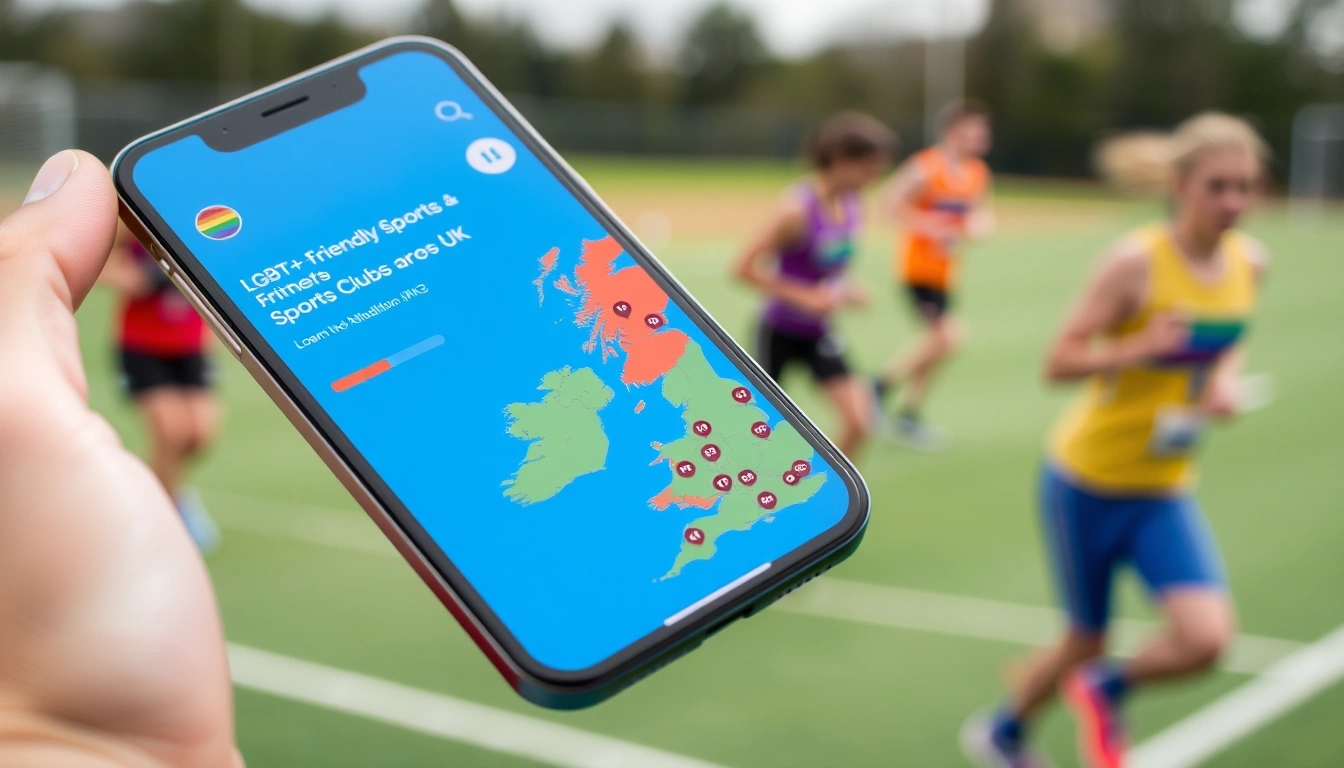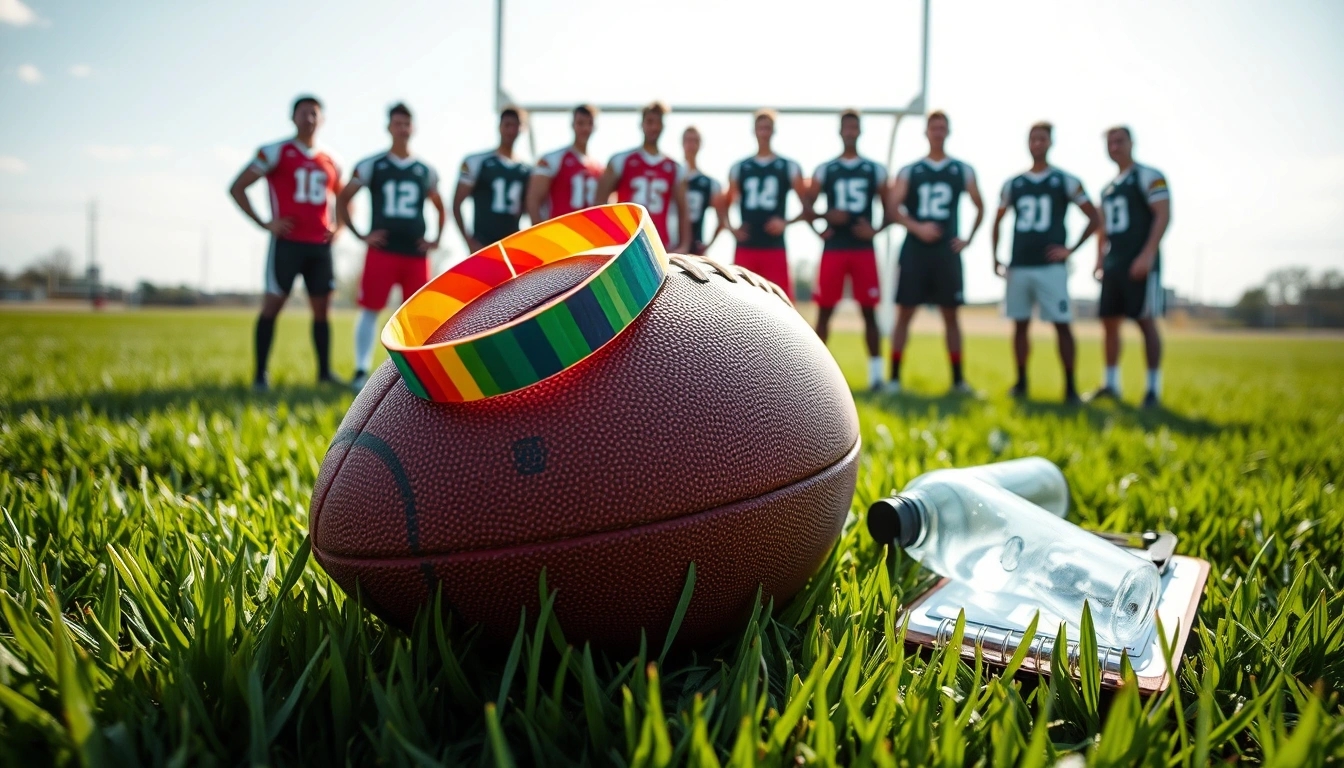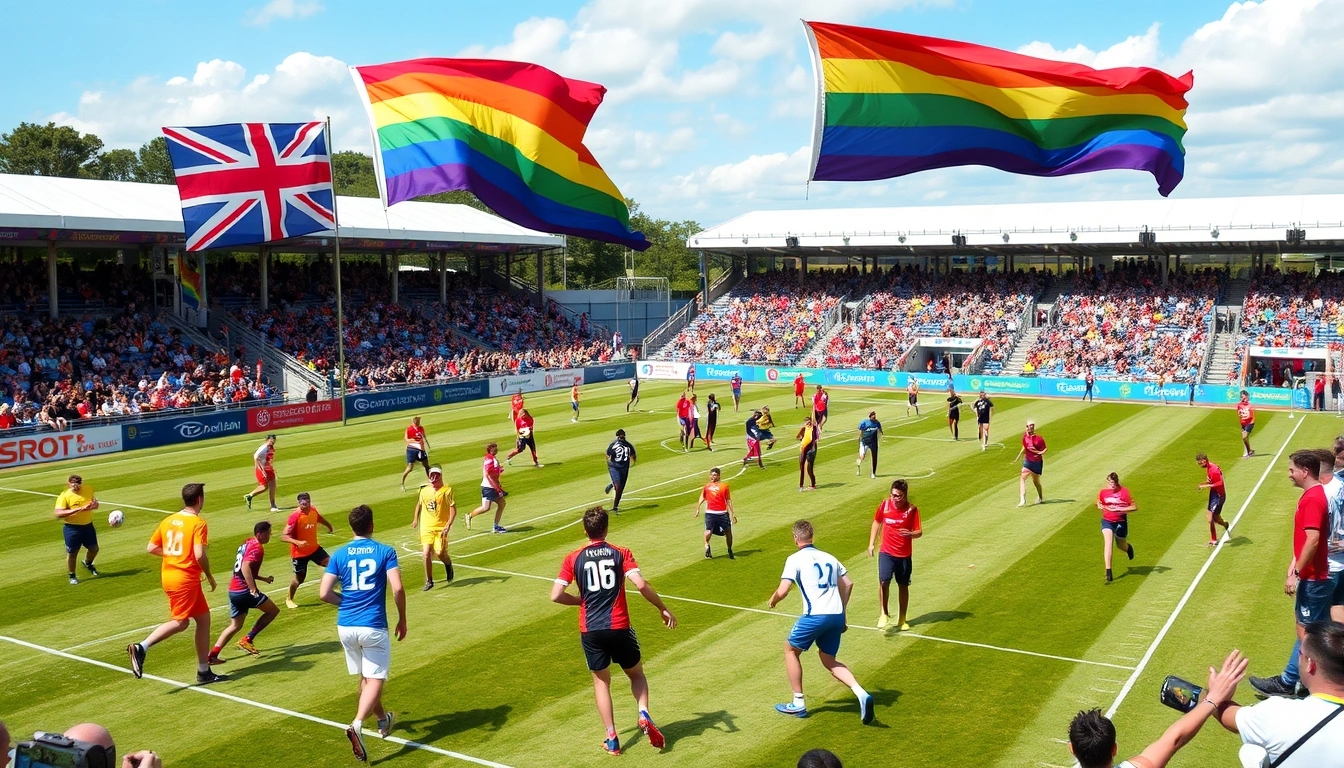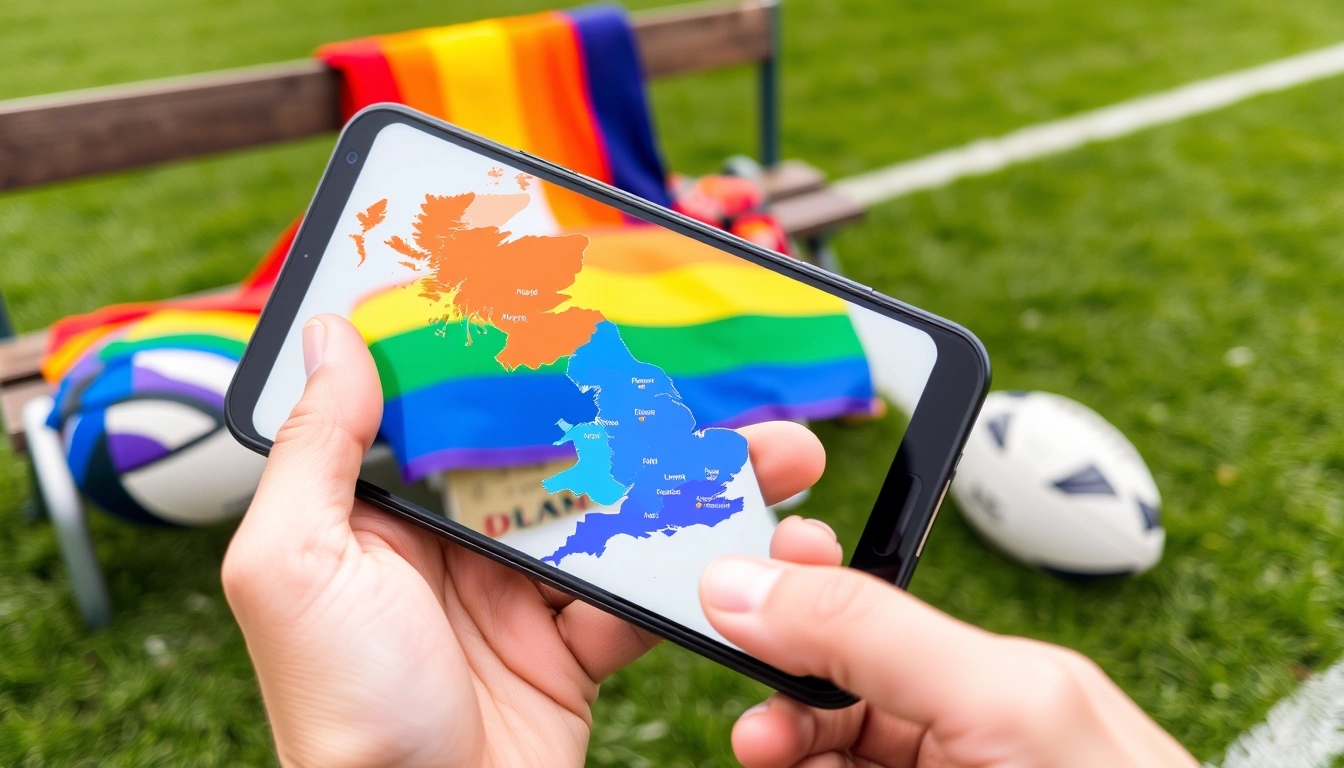Navigating the world of sports as an LGBTQ+ person in the UK can sometimes feel like trying to find a needle in a haystack — except the haystack is full of sweaty jerseys and awkward locker room moments. But hey, don’t despair just yet! There are plenty of clubs out there that genuinely welcome you for who you are, not just the athlete you want to be. The trick is knowing where to look and what signs to watch out for. This guide aims to be your compass in the often confusing maze of sports clubs, helping you find those safe, inclusive spaces where you can focus on smashing goals, not worrying about acceptance.
Why does LGBTQ+ inclusivity in sports even matter?
Let’s get real for a second: sports have historically been a bit of a boys’ club, and sometimes that club wasn’t exactly rolling out the rainbow carpet. Inclusive clubs do more than just say “everyone’s welcome” on their website—they create environments where LGBTQ+ athletes can thrive without fear of discrimination or microaggressions. This isn’t just about fairness in play; it’s about mental health, community, and yes, even performance. When you feel accepted, you play better. Period. Plus, inclusive clubs often become hubs for building friendships and support networks outside the game, which is priceless.
| Impact of Inclusivity | Details |
|---|---|
| Mental Health | Reduced anxiety and stress from fear of discrimination |
| Community Building | Creating safe spaces for connection and support |
| Fair Play | Ensuring equal opportunities and respect on and off the field |
Top LGBTQ+ friendly sports organizations in the UK
If you’re wondering where to start, organizations like Stonewall Sports and UK Sports Pride have been champions of inclusivity for years. They don’t just sit on the sidelines; these groups run initiatives, training, and events that actively support LGBTQ+ athletes. They also maintain directories of clubs that have demonstrated commitment to inclusivity. And yes, they’ve seen their fair share of awkward questions and slow progress, but they keep pushing, which is what counts.
- Stonewall Sports: Known for advocacy and a solid network of inclusive clubs.
- UK Sports Pride: Focuses on education and visibility in mainstream sports.
- Pride Sports: Organizes tournaments and social events to connect LGBTQ+ athletes.
Finding clubs online: Your first port of call
In this digital age, it’s easier than ever to find LGBTQ+ friendly sports clubs online, but beware — not every “inclusive” label means much. Websites like Pride Sports and apps such as Meetup often list local groups, but always dig a little deeper. Check social media pages for recent activity and member feedback. A club that’s genuinely welcoming will have visible LGBTQ+ representation and open channels for questions. Don’t be shy; reach out and ask!
Tips for Online Searching:- Use keywords like "LGBTQ+ friendly," "inclusive," or "queer sports club"- Look for clubs with clear anti-discrimination policies- Check for mixed-gender or non-binary friendly teams- Read reviews or testimonials from current members
Local gems: Clubs worth checking out
If you’re in London, Manchester, or Brighton, you’re in luck. Cities like these have grassroots clubs that have earned reputations for being safe havens. For example, London Orcas Rugby Club and Manchester Village Spartans are more than just teams; they’re communities. Even smaller cities are catching on, so don’t hesitate to ask around or check local LGBTQ+ centres for recommendations.
| City | Club | Sport | Why It’s Great |
|---|---|---|---|
| London | London Orcas | Rugby | Strong LGBTQ+ presence, social events |
| Manchester | Village Spartans | Multiple sports | Inclusive, competitive, supportive |
| Brighton | Brighton & Hove Sea Serpents | Swimming | Welcoming atmosphere, community focus |
Spotting the real deal: Red flags and green flags
Not every club that claims to be LGBTQ+ friendly actually walks the talk. Watch out for clubs that only pay lip service or use inclusivity as a marketing ploy without backing it up with action. Genuine inclusivity means clear policies, training for staff, and an environment where everyone feels safe to be themselves. If you hear cringeworthy jokes or see a lack of diversity, those are red flags. Conversely, clubs that celebrate Pride, have openly LGBTQ+ coaches, and foster respectful communication are green flags worth chasing.
In the end, finding the right sports club is a bit like dating — you might have to try a few before you find “the one.” But trust me, those welcoming, inclusive spaces do exist, and once you find them, your sporting journey will feel a whole lot less daunting and a lot more fun.
Understanding the importance of LGBTQ+ inclusivity in sports
Navigating the world of sports can be tough for anyone, but for LGBTQ+ athletes, it often comes with an extra layer of challenges. Let’s be honest, sports have traditionally been a bit of a boys’ club or a heteronormative playground, and not everyone feels welcome. That’s why having inclusive sports clubs isn’t just a “nice-to-have” — it’s absolutely essential.
First off, mental health. Imagine constantly second-guessing if you’ll be accepted or if you’ll face outright discrimination every time you step onto the field or court. It’s exhausting. Inclusive clubs provide a safe space where athletes can focus on their game instead of worrying about their identity being a problem. This kind of environment reduces anxiety and depression, which, spoiler alert, are way too common among LGBTQ+ youth and adults. When people feel accepted, they perform better, stick around longer, and actually enjoy their sport. That’s a win-win, right?
| Impact Area | Why it Matters | Outcome |
|---|---|---|
| Mental Health | Safe, accepting environments reduce stress and anxiety | Better wellbeing and sustained participation |
| Community Building | Creates bonds beyond the sport, fostering belonging | Stronger support networks and friendships |
| Fair Play | Ensures equal opportunity and respect on and off the field | Level playing field and improved team dynamics |
Community building is another huge piece of the puzzle. Sports clubs that embrace inclusivity become hubs where people can connect beyond just the game. It’s about finding your tribe — teammates who get you, cheer you on, and have your back. This sense of belonging is powerful; it helps combat isolation, which, let’s face it, is a big problem for many LGBTQ+ folks. When clubs celebrate diversity, they don’t just make sports better, they make lives better.
And then there’s the whole fair play aspect. Inclusivity isn’t just about waving rainbow flags or having a diversity statement on the website. It’s about ensuring that everyone, no matter their gender identity or sexual orientation, can compete fairly and feel respected. This means tackling unconscious bias, addressing discriminatory behaviour head-on, and making sure policies don’t exclude or disadvantage anyone. It’s about integrity in sport — something every athlete deserves.
- Why does this matter in the UK’s sporting landscape? Because the UK prides itself on diversity and equality, right? Yet, LGBTQ+ athletes still face barriers. Inclusive clubs help bridge that gap, pushing the entire sports culture forward.
- What’s the ripple effect? More LGBTQ+ visibility in sports encourages younger generations to get involved, knowing they won’t have to hide who they are. That’s how change happens.
- And yes, it’s not perfect yet. There are still clubs out there that pay lip service to inclusivity without real action, so being able to spot genuine inclusivity is key.
So, to wrap it up — inclusive sports clubs are more than just “nice places to play.” They’re vital for mental health, community, and fairness. They help dismantle outdated stereotypes and open doors for LGBTQ+ athletes to thrive. And honestly, isn’t that what sports should be all about? Whether you’re just starting out or a seasoned player, finding or fostering an inclusive club can change your game — on and off the field.
Top LGBTQ+ friendly sports organizations in the UK
Alright, diving into the world of UK sports organizations that genuinely walk the talk when it comes to LGBTQ+ inclusivity — it’s a mixed bag, but some groups really stand out. Let’s be honest, not every sports body has nailed it yet, but there are shining examples that keep pushing boundaries, making sport a safer, more welcoming place for everyone.
First up, Stonewall Sports Champions — these folks have been around the block, championing LGBTQ+ rights in sports since forever (well, since 2015, but that’s ages in activism terms). Their initiatives don’t just stop at rainbow flags; they run campaigns, training sessions, and provide resources to clubs and governing bodies to help squash discrimination and promote inclusion. If you want to see real change, Stonewall’s approach is hands-on and practical.
| Organization | Key Initiatives | Support Offered |
|---|---|---|
| Stonewall Sports Champions | Awareness campaigns, inclusivity training, policy advice | Resources for clubs, networking, advocacy |
| British Athletes Commission (BAC) | LGBTQ+ athlete support, mental health programs | Confidential advice, peer support groups |
| Inclusive Cricket UK | Grassroots club support, tournaments, coaching | Safe spaces, coaching courses, event organization |
Then there’s the British Athletes Commission (BAC). They might not be the flashiest name in the game, but they’re quietly doing some solid work supporting LGBTQ+ athletes across all levels. Their focus on mental health is particularly important — because let’s face it, sports can be brutal mentally, and being LGBTQ+ sometimes adds another layer of pressure. BAC offers confidential advice and runs peer support groups that can be a lifeline.
Now, if cricket’s your thing, you can’t overlook Inclusive Cricket UK. Cricket has traditionally been a bit of a “boys’ club,” but this organization is smashing that stereotype. They’re all about creating grassroots clubs where LGBTQ+ players feel safe and welcome. Plus, they organize tournaments and coaching courses that emphasize inclusivity. It’s grassroots, it’s real, and it’s growing fast.
- Why do these organizations matter?
Because sports should be for everyone, right? These groups don’t just slap on a rainbow sticker and call it a day. They actively work to change attitudes, policies, and environments so LGBTQ+ athletes can thrive without fear of judgment or exclusion. - What about the rest?
Sure, some clubs and bodies pay lip service to inclusivity but fall short in practice. That’s why these organizations are crucial—they hold the mirror up to the sport world and say, “You can do better.”
Practical Tips:- Check if clubs are affiliated with these organizations; it’s a good sign.- Look out for training or workshops offered by these bodies — they indicate commitment.- Use their resources if you’re starting your own inclusive club or just want to learn more.
In the end, finding a truly LGBTQ+ friendly sports organization in the UK isn’t just about who’s got the loudest rainbow banner. It’s about who’s putting in the work behind the scenes, supporting their members, and pushing for real, lasting change. These top organizations? They’re leading the charge, and honestly, we could all use a bit more of their spirit.

Where to start: Online platforms and directories
Finding LGBTQ+ friendly sports clubs in the UK can feel like searching for a needle in a haystack if you don’t know where to look. Thankfully, the digital age has come to the rescue with a bunch of websites and apps designed specifically to connect LGBTQ+ athletes with welcoming and inclusive sports communities. These platforms act as a compass, guiding you toward safe spaces where you can just be yourself and enjoy the game without worrying about judgment or discrimination.
Let’s be honest, the sports world hasn’t always been the easiest place for LGBTQ+ folks. So having dedicated online directories that focus on inclusivity is a game changer. They don’t just list clubs; they highlight those that actively promote diversity and acceptance. This means you don’t have to waste time calling around or visiting clubs that might not be as friendly as they claim. Instead, you get a curated list of options tailored to your needs.
| Platform | Features | Sports Covered | Accessibility |
|---|---|---|---|
| OutSports UK | Comprehensive directory, user reviews, event calendar | Football, Rugby, Tennis, Running, Swimming | Website & Mobile App |
| PridePlay | Interactive maps, club ratings, community forums | Multi-sport inclusive | Mobile App |
| RainbowAthlete Hub | Mentorship programs, inclusive club listings | Various including cycling, boxing, athletics | Website |
Now, don’t get me wrong, no platform is perfect. Some might have outdated info or clubs that have changed their vibe since the last update. So, a little due diligence on your part helps — maybe check social media pages or ask around in LGBTQ+ sports groups online. Speaking of which, many of these platforms also have forums or social features where you can chat with other athletes, get first-hand recommendations, or even find teammates.
- Tip 1: Use filters on these sites to narrow down clubs by sport, location, and level of competitiveness.
- Tip 2: Look for clubs with clear anti-discrimination policies and visible signs of inclusivity, like rainbow logos or participation in Pride events.
- Tip 3: Don’t hesitate to reach out directly to club organizers before committing – a quick chat can reveal a lot about the club’s atmosphere.
Sometimes, apps like PridePlay even offer features that allow you to track your progress, connect with local events, or find LGBTQ+ friendly coaches. It’s like having a personal sports buddy in your pocket. Plus, these platforms often spotlight upcoming tournaments or social events, which are perfect opportunities to get involved without the pressure of joining a full-time club right away.
Example: Jane, a keen runner from Manchester, used OutSports UK to find a local LGBTQ+ running group. She attended a few meetups, loved the vibe, and now she’s training for her first marathon with a supportive crew cheering her on.
In the end, these online platforms and directories are more than just lists – they’re gateways to community, acceptance, and fun. So if you’re an LGBTQ+ athlete in the UK wondering where to start, diving into these resources is definitely the way to go. Just remember, inclusivity isn’t just about ticking boxes; it’s about feeling welcome and valued whenever you step onto the field or court.
Happy hunting, and may your next sports adventure be full of pride and great company!
Local LGBTQ+ sports clubs worth checking out
Finding a sports club that truly welcomes LGBTQ+ players can sometimes feel like searching for a unicorn in the UK’s vast sporting landscape. But hey, don’t lose hope just yet! There are some fantastic grassroots clubs scattered across major cities that genuinely embrace diversity and inclusivity. These clubs don’t just talk the talk; they walk the walk, creating safe spaces where everyone can play, compete, and just be themselves without the usual awkwardness or judgment.
Let’s kick off with London, which is home to several notable LGBTQ+ friendly clubs. Take Stonewall FC, for instance. This football club has a reputation for being one of the most inclusive in the country. They’re not just about winning matches; they’re about building community and smashing stereotypes. Then there’s London Frontrunners, a running club that welcomes runners of all abilities and identities. Their weekly meet-ups are as much about social bonding as they are about pounding the pavement.
| City | Club Name | Sport | Why It’s Great |
|---|---|---|---|
| London | Stonewall FC | Football | Inclusive, community-focused, active in LGBTQ+ advocacy |
| Manchester | Manchester Village Spartans | Rugby | Welcoming atmosphere, competitive yet friendly |
| Bristol | Bristol Bisons | Rugby | Strong community spirit, open to all skill levels |
| Glasgow | Glasgow Warriors LGBTQ+ Network | Various | Broad sports coverage, excellent support network |
Manchester’s got its own gem: Manchester Village Spartans Rugby Club. These lads and lasses are known for their fierce passion on the pitch and their warm welcome off it. Whether you’re a seasoned player or a newbie, they’ll make you feel right at home. Plus, they’re pretty active in organizing social events, so you’re not just joining a club, you’re joining a community.
Down in Bristol, Bristol Bisons are making waves. This inclusive rugby club has been steadily growing their membership, attracting players who want to enjoy sport without the usual locker room drama. It’s a place where you can bring your authentic self and focus on the game, not on fitting in.
- Why choose these clubs? Because they’re more than just sports teams—they’re hubs of support, friendship, and activism.
- What to expect? Friendly faces, open-minded coaches, and a zero-tolerance policy on discrimination.
- How to join? Most clubs have open days or introductory sessions. Check their websites or social media for the latest info.
And let’s not forget Glasgow, where the Glasgow Warriors LGBTQ+ Network offers a broad spectrum of sports activities and a fantastic support system. It’s perfect if you want to try out different sports or just meet like-minded folks who get it.
Look, finding the right club can be a bit of a minefield, especially if you’re wary of token gestures or clubs that say they’re inclusive but don’t quite deliver. The good news? These grassroots outfits genuinely care. They’re built by people who understand the importance of safe spaces in sports, and they work hard to keep them that way.
So, if you’re in one of these cities—or even nearby—don’t hesitate to reach out. Give it a go, and remember, it’s totally normal to feel a bit nervous at first. But once you’re in, you might just find your second family on the pitch or track.
How to identify truly inclusive clubs: Red flags and green flags
Alright, let’s cut through the noise. When a sports club claims to be LGBTQ+ friendly, it’s not always sunshine and rainbows behind that banner. Some clubs genuinely embrace inclusivity, while others might just be ticking boxes or worse, using it as a marketing gimmick. So, how do you tell the difference? Here’s the lowdown on spotting real inclusivity versus tokenism when checking out sports clubs.
First off, genuine clubs don’t just slap a rainbow sticker on their website and call it a day. They have visible, ongoing initiatives that promote inclusiveness. Think regular diversity training for coaches and members, clear anti-discrimination policies, and a culture where everyone feels safe to be themselves. If you don’t see any of this, that’s your first red flag.
| Red Flags | Green Flags |
|---|---|
| Token gestures without real action (rainbow flags but no policies) | Active LGBTQ+ committees or dedicated inclusion officers |
| Ignoring or dismissing member concerns about discrimination | Clear channels for reporting issues and prompt responses |
| Clubs that only mention LGBTQ+ inclusivity during Pride month | Year-round support and events celebrating diversity |
| Language or jokes that alienate or stereotype LGBTQ+ people | Respectful communication and zero tolerance for harassment |
Another thing to watch out for is the representation within the club. Are LGBTQ+ members part of the leadership or coaching staff? If not, it might be a sign that inclusivity is just skin-deep. Authentic clubs often have queer voices shaping their policies and culture. Plus, they encourage open dialogue rather than sweeping issues under the rug.
Now, don’t be shy about asking questions! It’s perfectly okay to probe a bit. You could ask about their anti-discrimination policies, how they handle complaints, or what kind of training they provide. If they get defensive or vague, that’s a warning bell.
- Check the club’s social media: Are LGBTQ+ events or messages consistently shared, or is it just a one-off post?
- Look for testimonials: Genuine clubs often showcase stories from LGBTQ+ members sharing positive experiences.
- Attend a trial session: Sometimes, the vibe you get in person tells you more than any website can.
And hey, don’t forget that no club is perfect. Even the best ones might slip up occasionally. But the key difference is accountability—inclusive clubs own their mistakes and work to fix them, rather than brushing them off.
In short, spotting a truly inclusive sports club is about digging deeper than surface-level signs. Look for consistent, sincere efforts that create a safe, welcoming space for everyone. Otherwise, you might just end up in a place that’s all talk and no heart.

Interviews with LGBTQ+ athletes on their club experiences
Real stories from LGBTQ+ athletes paint a vivid picture of what it’s really like to join sports clubs in the UK. It’s not all sunshine and rainbows, but then again, when is it ever? These voices share the ups and downs of trying to find a space where you can just be yourself, without the constant worry of feeling out of place or worse, unwelcome.
Take Jamie, a keen footballer from Manchester, who recalls his first season with a local club. “At first, I thought I’d stumbled into some kind of parallel universe where everyone just got it. Turns out, not so much. Some teammates were cool, others… well, let’s just say the locker room banter wasn’t always PG.” Jamie’s experience highlights the mixed bag that can be club culture. The good news? Over time, the club introduced sensitivity training and started openly supporting LGBTQ+ events, which made a world of difference.
| Athlete | Sport | Experience Summary |
|---|---|---|
| Jamie | Football | Initial mixed reactions; gradual improvement with club initiatives |
| Alex | Rugby | Found immediate acceptance in a niche LGBTQ+ club |
| Sara | Swimming | Faced subtle exclusion; eventually switched clubs |
Then there’s Alex, who plays rugby in London. Joining an explicitly LGBTQ+ friendly club was a game changer. “It’s like night and day,” Alex says. “No weird looks, no awkward silences. Just rugby, mateship, and a whole lot of laughs.” The sense of belonging here is palpable, proving that clubs designed with inclusivity in mind don’t just tick boxes—they create genuine community.
But not every story ends on a high note. Sara, a competitive swimmer, shares a more complicated tale. “I felt like I was swimming upstream, not just with the water but socially too. Some coaches didn’t know how to handle my identity, and teammates sometimes acted like I was invisible.” Eventually, Sara moved to another club with a better reputation for inclusivity, and things improved, but the scars from that first experience linger.
- Key takeaways from athlete interviews:
- Inclusivity is more than a slogan—it requires ongoing effort and education.
- Safe spaces matter—clubs that openly support LGBTQ+ members foster better team spirit.
- Not all clubs are ready—some still need to catch up on understanding and acceptance.
So, what makes a club truly inclusive? From these stories, it’s clear that actions speak louder than words. It’s about the little things—respectful language, visible support for LGBTQ+ events, zero tolerance for discrimination, and most importantly, a culture where athletes feel comfortable bringing their whole selves to the game.
Here’s a quick checklist to help you gauge if a club might be right for you:
- Do they have openly LGBTQ+ members or leadership?- Are there clear anti-discrimination policies?- Is there visible support for LGBTQ+ events or causes?- Do current members speak positively about inclusivity?- Are there resources or contacts for LGBTQ+ support within the club?
In the end, these interviews remind us that while progress has been made, the journey toward truly inclusive sports clubs is ongoing. For LGBTQ+ athletes, finding the right club can feel like searching for a needle in a haystack, but those needles are out there—sometimes you just have to dig a bit.
Role of allies in promoting LGBTQ+ inclusivity in sports
Alright, let’s get real for a moment. Sports have traditionally been seen as this macho, “tough it out” world, right? But times are changing, and thank goodness for that. The role of allies—those non-LGBTQ+ folks who stand shoulder to shoulder with their LGBTQ+ teammates and peers—is absolutely crucial in making sports communities welcoming and inclusive. Without allies, well, it’s like trying to play football with one leg tied behind your back: you might manage, but it’s nowhere near as effective or enjoyable.
So, what exactly can allies do? First off, it’s about more than just saying “I’m cool with LGBTQ+ people.” It’s about actively creating an environment where everyone feels safe and respected. That means calling out homophobic or transphobic remarks when they pop up (and trust me, they still do), supporting LGBTQ+ teammates during tough times, and educating themselves about the challenges these athletes face. Allies have to be willing to listen, learn, and sometimes even be uncomfortable. Because let’s face it, real change rarely happens in the comfort zone.
| Action | Why It Matters | Example |
|---|---|---|
| Speak Up Against Discrimination | Helps create a zero-tolerance culture for bigotry. | Interrupting a teammate’s offensive joke during practice. |
| Use Inclusive Language | Signals respect and acceptance. | Asking for pronouns and using them correctly. |
| Attend LGBTQ+ Events | Shows solidarity beyond just words. | Joining Pride tournaments or awareness workshops. |
| Educate Yourself | Reduces ignorance and misconceptions. | Reading up on LGBTQ+ history in sports. |
Here’s the kicker: allyship isn’t about being a hero or getting brownie points. It’s about genuine respect and understanding. Sometimes allies might feel unsure about saying the “right thing” or worry about offending someone. That’s perfectly normal. The key is to stay open, apologise if you mess up, and keep trying. Sports clubs that have strong ally networks tend to have better team cohesion, less bullying, and more players sticking around for the long haul.
- Listen More Than You Speak: It’s tempting to jump in and “fix” things, but often, the best support is just being there and hearing what LGBTQ+ athletes have to say.
- Be Visible: Wearing rainbow badges or including inclusive language in team communications can make a big difference.
- Challenge Stereotypes: Don’t buy into “locker room talk” or outdated ideas about masculinity and femininity.
Let’s not kid ourselves—there’s still a long way to go. Some sports remain stubbornly exclusive, and even with allies, LGBTQ+ athletes can face microaggressions or outright discrimination. But every ally who steps up chips away at that wall. It’s a team effort, literally and figuratively.
In the end, allyship in sports is about creating a culture where everyone, regardless of gender identity or sexual orientation, can focus on what really matters: playing the game, having fun, and feeling like they belong. If you’re part of a sports club and wondering how to be a better ally, start small. Ask questions, speak out, and don’t be afraid to make mistakes. Because that’s how progress happens—one awkward, imperfect step at a time.
Challenges LGBTQ+ athletes still face in UK sports clubs
Let’s not sugarcoat it: despite the strides made in recent years, LGBTQ+ athletes in UK sports clubs are still navigating a minefield. Sure, there are clubs waving rainbow flags and shouting inclusivity from the rooftops, but peel back the layers and you’ll find a cocktail of issues that haven’t quite vanished. Discrimination isn’t always blatant — it often hides behind polite smiles or awkward silences. Microaggressions, those tiny stings that accumulate, still plague many players daily. You know, the offhand comments, the “jokes” that aren’t funny, or the subtle exclusion from team banter. It’s exhausting, and it chips away at the sense of belonging that sport should provide.
| Issue | Examples | Impact on Athletes |
|---|---|---|
| Discrimination | Refusal to use correct pronouns, homophobic remarks | Lowered self-esteem, anxiety, withdrawal from sport |
| Microaggressions | “You don’t look gay,” excluding from social events | Feeling isolated, questioning identity acceptance |
| Lack of Representation | Few openly LGBTQ+ coaches or leaders | Limited role models, reduced motivation |
It’s not just about the occasional bad comment. The systemic issue of underrepresentation in leadership roles within clubs remains a huge hurdle. When athletes don’t see people like themselves in coaching or administrative positions, it sends a subtle message that they might not belong or have a voice. This absence can dampen enthusiasm and stunt the growth of truly inclusive cultures. And let’s face it, some clubs still treat LGBTQ+ inclusion as a box to tick rather than a genuine commitment — tokenism at its finest.
- Why does this matter? Because sports are meant to build confidence and community, not anxiety and alienation.
- What can clubs do better? Implement comprehensive training on LGBTQ+ issues, create safe reporting channels, and actively promote diversity in leadership.
- What about the athletes? Finding allies within teams and speaking up when possible can be empowering, though not always easy.
Now, here’s the kicker: progress is happening, but it’s slow and uneven. Some clubs are trailblazers, hosting LGBTQ+ tournaments and running education programs. Others? Well, let’s just say they’re stuck in the past, ignoring the subtle cries for change. It’s a mixed bag, and for many athletes, the journey to find a truly welcoming club feels like searching for a needle in a haystack.
Practical tips for LGBTQ+ athletes facing challenges:- Look for clubs with clear anti-discrimination policies.- Connect with local LGBTQ+ sports networks for support.- Don’t hesitate to ask about inclusivity during club visits.- Report incidents of discrimination to governing bodies.- Consider starting or joining LGBTQ+ specific teams if mainstream options feel hostile.
In the end, the fight for equality in sports isn’t just about jerseys and trophies. It’s about respect, dignity, and the simple right to play without fear. The UK’s sports scene has made some noise on this front, but the real work — the messy, uncomfortable, necessary conversations — is still underway. So, if you’re an LGBTQ+ athlete, know this: you’re not alone, and your voice matters, even if the road ahead sometimes feels bumpy. Keep pushing, keep playing, and demand that every club lives up to the promise of inclusivity. Because until then, the game isn’t truly fair.

Events and tournaments celebrating LGBTQ+ sports communities
Navigating the UK sports scene while being part of the LGBTQ+ community can sometimes feel like trying to find a unicorn in a football stadium—rare, elusive, and a bit mythical. Luckily, there are some annual events and tournaments that not only celebrate LGBTQ+ participation but also crank up the volume on visibility and inclusivity in sports. These events are more than just games; they’re vibrant festivals of identity, community, and, well, the occasional sweat and tears on the pitch.
Let’s kick things off with the UK Pride Games. This event is like the Olympics of LGBTQ+ sports in the UK, bringing together athletes from all over the country to compete in everything from football and rugby to swimming and athletics. What’s brilliant here is the mix of fierce competition and a welcoming atmosphere that screams, “You belong here!” It’s held annually in different cities, making it a kind of traveling carnival for queer sports enthusiasts.
| Event | Location | Sports Included | Time of Year |
|---|---|---|---|
| UK Pride Games | Rotates across UK cities | Football, Rugby, Swimming, Athletics, and more | Summer (June – August) |
| Rainbow Run | London | Running (5k and 10k) | Spring (April) |
| Out to Swim Gala | Various UK pools | Swimming competitions | Winter (December) |
| Inclusive Football Cup | Manchester | Football | Autumn (September) |
Then there’s the Rainbow Run in London, which is less about hardcore competition and more about community fun and raising awareness. It’s a colourful 5k and 10k run where everyone’s encouraged to don their brightest gear (think rainbows, glitter, and all things fabulous). It’s not just a run; it’s a statement that LGBTQ+ folks belong in every lane, on every track.
Swimming buffs shouldn’t miss the Out to Swim Gala, which hosts competitions across various UK pools. It’s a bit less flashy than the runs or football matches but just as important. Swimming can sometimes feel like a lonely sport for LGBTQ+ athletes, so events like this are a breath of fresh air (literally). The gala also offers social events where participants can swap stories, tips, and maybe even a cheeky pint after the races.
- Inclusive Football Cup in Manchester: A must for football lovers who want to compete in a welcoming environment free from judgement.
- London Gay Rugby Tournament: Rugby might be rough, but the spirit here is warm and inclusive.
- Queer Cricket Festival: For those who fancy a bat and ball, this festival celebrates LGBTQ+ cricketers and their allies.
Of course, these events aren’t just about the sport—they’re about visibility. They send a clear message: LGBTQ+ athletes are here, they’re talented, and they deserve a place on every field and court. Plus, they’re great opportunities to network, find new clubs, and maybe even discover your next sporting obsession.
If you’re thinking, “Sounds great, but how do I get involved?”, most events have websites or social media pages where you can sign up, volunteer, or just show up to cheer. And don’t worry if you’re not a pro athlete; these events welcome all levels, from the “I just learned how to dribble” to the “I’ve been playing since I could walk.”
So, whether you’re in London, Manchester, or somewhere in between, keep an eye out for these events. They’re not just games—they’re celebrations of courage, community, and the pure joy of playing sports as your authentic self.
Quick Tips for Attending LGBTQ+ Sports Events:
- Check event dates early—some fill up fast!
- Don’t hesitate to reach out to organisers with questions.
- Bring friends or allies to share the experience.
- Wear comfortable gear and, if you’re feeling bold, something rainbow-themed.
- Remember, it’s about fun, inclusion, and community—not just winning.
In the end, these events remind us all that sport isn’t just about competition; it’s about connection. And for LGBTQ+ athletes, that connection can be a lifeline in a world that often forgets to make room for everyone.
How to start your own LGBTQ+ friendly sports club
So, you’re fired up to create a sports club where everyone feels welcome, regardless of their gender identity or sexual orientation? That’s fantastic! But before you jump headfirst into organizing matches and picking team kits, there’s a bit more to it than just enthusiasm. Setting up an LGBTQ+ friendly sports club is about building a community, navigating some legal hoops, and finding the right support to keep things running smoothly.
Legal considerations – the not-so-glamorous but essential part
First off, you’ll want to get familiar with the legal side of things. Registering your club as a legal entity (usually a nonprofit or community group) can protect you and your members. This means sorting out your constitution or club rules – think about how decisions are made, membership criteria, and codes of conduct that explicitly promote inclusivity and zero tolerance for discrimination. Also, make sure you’re up to speed with the Equality Act 2010, which protects people from discrimination based on sexual orientation and gender reassignment. Ignoring this? Not a good idea.
| Legal Steps | Why It Matters |
|---|---|
| Register as a nonprofit/community group | Gives your club a formal identity and access to funding |
| Draft clear, inclusive club rules | Sets expectations and protects members |
| Understand Equality Act 2010 | Ensures compliance with anti-discrimination laws |
Community outreach – because no club is an island
Once the legal stuff is sorted, it’s time to connect with your local community. Reach out to LGBTQ+ centres, sports networks, and even universities. Social media is your friend here – create a Facebook group or Instagram page to spread the word. Hosting open days or trial sessions can lower the barrier for folks hesitant about joining something new. Remember, inclusivity isn’t just about who’s allowed in, but how welcomed they feel.
- Partner with local LGBTQ+ organisations to boost visibility
- Engage allies to widen your support network
- Encourage feedback from members to improve club culture
Funding – because passion doesn’t pay for equipment
Money, money, money. It’s the eternal headache. Luckily, there are grants and funding streams aimed specifically at promoting inclusivity in sports. Sport England, local councils, and LGBTQ+ charities often have pots of cash for projects like yours. Crowdfunding can also be surprisingly effective, especially if you tell your club’s story well. Don’t forget to budget for essentials like kit, venue hire, coaching, and marketing materials.
Tips for securing funding:- Research grants focused on equality and community sport- Prepare a clear project plan outlining your club’s goals- Highlight the social impact and inclusivity aspects- Use testimonials or letters of support from community leaders
Starting your own LGBTQ+ friendly sports club isn’t just about sports. It’s about creating a space where people feel safe, respected, and free to be themselves. Sure, it takes work, patience, and sometimes a bit of trial and error, but the payoff? A vibrant, supportive community that celebrates diversity in every kick, throw, or sprint. So, lace up those trainers and get ready to make a difference – the pitch is waiting.
Resources and support networks for LGBTQ+ athletes in the UK
Finding your footing in the sports world can be a bit of a minefield, especially if you’re an LGBTQ+ athlete trying to navigate the often tricky waters of acceptance, support, and community. Luckily, the UK has been stepping up its game with a growing number of resources and networks that are designed to help you not just survive, but thrive. Whether you’re looking for mentorship, a shoulder to lean on, or just a squad that gets you, there’s something out there — you just have to know where to look.
Why these networks matter
Let’s be real: sports can sometimes feel like an exclusive club where you either fit in or you don’t. For LGBTQ+ athletes, this can mean facing subtle microaggressions, outright discrimination, or just feeling invisible. Support networks provide a vital lifeline — places where you can share experiences, get advice, and find allies who’ve been through the same struggles. It’s about building confidence and creating safe spaces where your identity is respected and celebrated.
Where to start? Here’s a handy list:
- Stonewall Sport – One of the UK’s leading LGBTQ+ organizations, Stonewall offers guidance and runs campaigns to make sports more inclusive. They also provide a list of LGBTQ+ friendly sports clubs across the country.
- Sport Allies – This group focuses on education and advocacy, helping sports clubs and organizations become truly welcoming to LGBTQ+ athletes.
- UK Sports Association for LGBTQ+ (UKSA) – A network that connects LGBTQ+ sportspeople, offering mentorship and community events.
- Local LGBTQ+ Community Centres – Many cities have centres that run sports activities or can connect you with local inclusive clubs.
| Organization | What They Offer | Website |
|---|---|---|
| Stonewall Sport | Inclusive club listings, campaigns, resources | stonewall.org.uk |
| Sport Allies | Education, advocacy, workshops | sportallies.com |
| UKSA | Mentorship, networking events | uksa.org |
Now, if you’re feeling a bit overwhelmed, don’t sweat it. It’s totally normal. The key is to reach out and connect. Even if you’re just dipping your toes in, joining online forums or social media groups dedicated to LGBTQ+ sportspeople can be a game changer. You’ll find people sharing stories, tips, and sometimes just venting about the nonsense they’ve faced — and that shared experience can be incredibly validating.
Mentorship: The secret sauce
Having a mentor who’s been there, done that, and still rocking their rainbow flag can make all the difference. Mentorship programs offered by some of these organizations pair you with experienced athletes or coaches who can guide you through challenges, whether it’s dealing with discrimination, coming out in your team, or just balancing sport with life. And trust me, hearing “I get it” from someone who actually means it? Priceless.
- Tip: Don’t be shy about asking for help. Everyone needs it.
- Tip: Check if your club or sport’s governing body has LGBTQ+ liaison officers or support groups.
At the end of the day, the goal is simple: to make sports a place where you can be your authentic self without fear or hesitation. The UK’s LGBTQ+ sports community is growing stronger every day, and with the right resources, you can find your team — on and off the pitch.
So, lace up, reach out, and remember: you’re not alone out there.
Frequently Asked Questions
- Why is LGBTQ+ inclusivity important in sports clubs?
Inclusivity in sports clubs creates a safe and supportive environment where LGBTQ+ athletes can thrive without fear of discrimination or exclusion. It boosts mental health, fosters community spirit, and ensures fair play, making sports enjoyable and accessible for everyone.
- How can I find LGBTQ+ friendly sports clubs in the UK?
Start by exploring dedicated online platforms and directories that list inclusive sports clubs. Many websites and apps focus on connecting LGBTQ+ athletes with welcoming clubs across various sports and cities in the UK.
- What are some signs of a genuinely inclusive sports club?
Look for clubs that actively promote diversity, have clear anti-discrimination policies, and encourage open dialogue. Genuine inclusivity shines through in their actions—like hosting LGBTQ+ events or training sessions—rather than just token gestures.
- Are there local LGBTQ+ sports clubs I can join?
Absolutely! Many major UK cities have grassroots sports clubs known for their welcoming atmospheres. These clubs often focus on creating tight-knit communities where everyone feels valued and supported.
- What role do allies play in LGBTQ+ inclusive sports?
Allies are crucial—they help build a culture of respect and acceptance by standing up against discrimination and supporting LGBTQ+ members. Their involvement strengthens the community and promotes lasting change.
- What challenges do LGBTQ+ athletes still face in UK sports?
Despite progress, issues like microaggressions, underrepresentation, and occasional discrimination persist. Awareness and active efforts from clubs and individuals are key to overcoming these hurdles.
- Can I start my own LGBTQ+ friendly sports club?
Definitely! Starting a club involves understanding legal requirements, securing funding, and reaching out to the community. With passion and planning, you can create a vibrant, inclusive space for LGBTQ+ athletes.
- Where can I find support and resources as an LGBTQ+ athlete?
There are numerous support networks, mentorship programs, and community organizations across the UK dedicated to helping LGBTQ+ sportspeople. These resources offer guidance, advice, and a sense of belonging.
- Are there any events celebrating LGBTQ+ sports communities?
Yes! The UK hosts various annual tournaments and events that celebrate LGBTQ+ participation in sports. These gatherings promote visibility, camaraderie, and the joy of playing in an inclusive environment.













